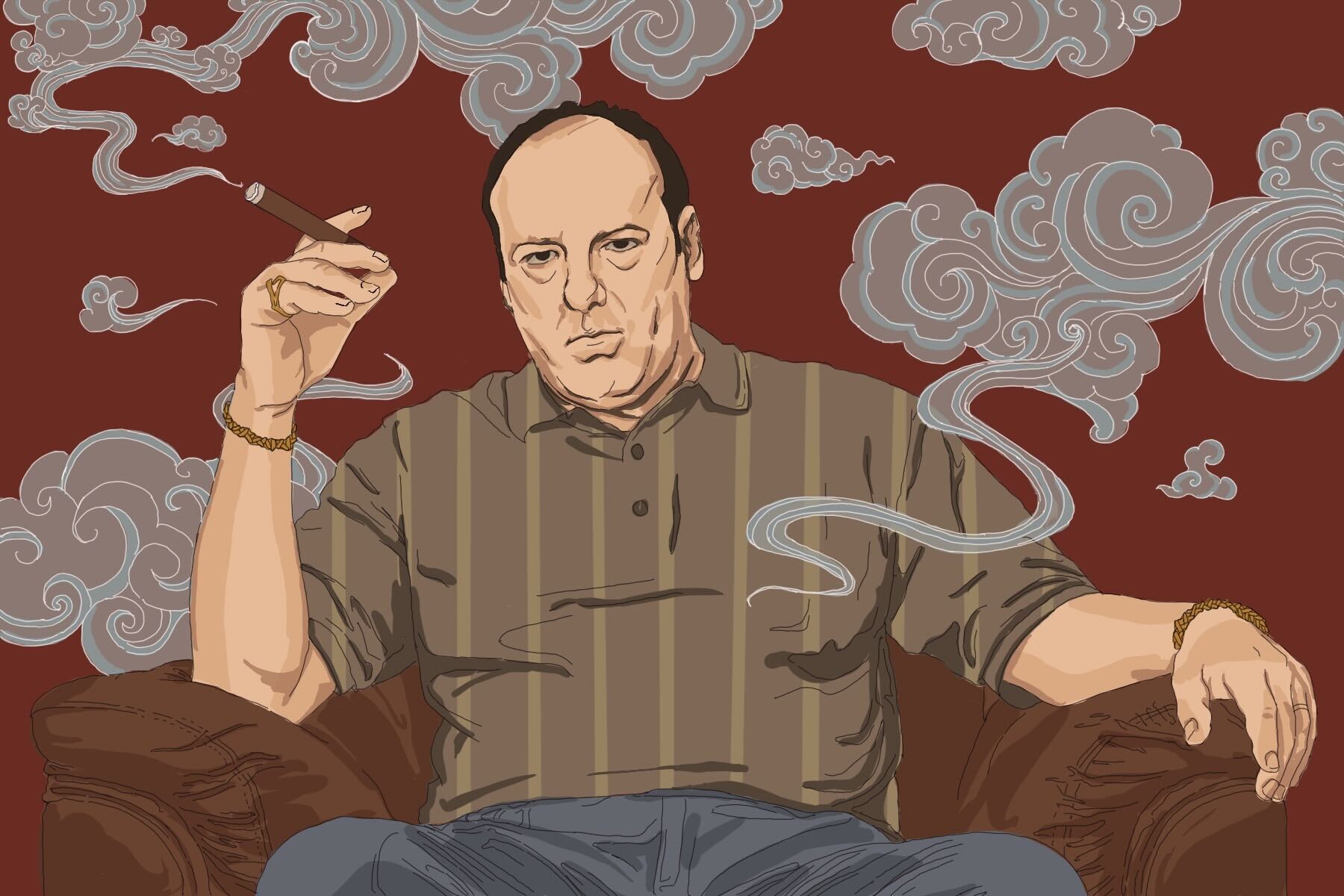Over two decades ago, relatively unknown New York-born TV editor David Chase sought to create a feature film about “a mobster in therapy having problems with his mother.” He eventually made the decision to turn the idea into a TV show instead, and thus “The Sopranos” was born. “The Sopranos” is widely regarded as one of the greatest TV shows to ever exist. It stars the late James Gandolfini as the anxiety and depression-ridden mob boss known as Tony Soprano, who struggles to navigate family life, mental health and the intricacies of his work. Thanks to the first COVID-19 quarantine, the show experienced a resurgence in popularity and re-entered the long-standing discussion of what makes good TV. What followed was a new group of viewers eager to enjoy and analyze it through the lens of today’s generation. Years earlier, a 2016 Rolling Stone article ranked the series as the greatest of all time in a list of 100 TV shows.
The series was a blueprint for future TV shows that feature long-standing antiheroes as protagonists. Morally ambiguous, the characters are, from an objective standpoint, deplorable people who have little regard for human life and see others as feathers to be plucked. “The Sopranos” allowed for the creation of these antihero protagonists who are morally questionable (or even morally reprehensible) and yet simultaneously captivating in popular TV shows.
Matthew Weiner, a writer on “The Sopranos,” created the show “Mad Men” and the controversial and manipulative character Don Draper. James Manos Jr., another writer on “The Sopranos,” created “Dexter,” whose main character is a serial killer. Vince Gilligan, the creator of “Breaking Bad,” famously said that the character of Walter White would not exist without Tony Soprano. Bryan Cranston, who played Walter White, said the same in a tweet following Gandolfini’s passing in 2013. “The Sopranos” paved the way for shows like these and ushered us into a golden age of television where viewers are forced to confront the complexity of humanity and morality.
Typically, morally ambiguous characters and complex storytelling become the subject of deep analysis, which before “The Sopranos” was a phenomenon reserved for cinema and not television. What typically counted as good TV in the 1990s included sitcoms with laugh tracks and episodic storylines. Shows like “Seinfeld” or “Friends,” while successful and enjoyable in their own right, rarely had characters who experienced meaningful character development or deeper storylines that extended beyond one or two episodes. There was little room for the analysis of cinematographic choices or symbolism. This is unlike “The Sopranos,” which has episodes that could each be considered miniature movies in their own way.
One example is the fifth episode of the series, “College,” which single-handedly solidified “The Sopranos” as the greatest TV show of all time while creating an entirely new standard for future TV show creators. While masterfully cinematic and rife with symbols that evoked themes established in earlier episodes, “College” can be watched alone; one does not need to have watched the first four episodes of the series to enjoy it and take meaning from it.
The episode is also the first ever to display a senseless murder committed by the protagonist, which was previously unheard of — particularly for television. While other TV shows might have had central characters who committed murders before “The Sopranos,” there was always a justification that could explain why the character was written that way, such as self-defense or for selfless reasons like the safety and greater good of a community. Meanwhile, the person Tony kills in “College” is murdered for being an FBI informant against the mob. Not only is the on-screen murder completely morally unjustified, but it is also truly brutal. The audience witnessed Tony murder somebody with his bare hands for no good reason, and they loved it.
Viewers admired how “College” pushed boundaries. The fact that a character like Tony was so well received had a great impact on the TV industry. It transgressed past the ideas of what was considered acceptable behavior for a protagonist and forced the audience to question what horrible acts people are willing to justify and why.
While Tony is mostly selfish, murderous and money-driven, he also displays moments of vulnerability throughout the series and shows the audience that he could be sympathetic and is capable of doing good. He is sometimes generous and forgiving of those around him, but those moments are often to protect himself from suspicion or to feed his ego, or the intentions behind the acts are laced with the possibility that those people could eventually serve his interests in some way. This became increasingly evident as the series progresses and Tony becomes more and more motivated by money and power. Rarely did the audience witness Tony Soprano commit an act of goodwill for the sake of anybody but himself.
The way Tony Soprano’s various interpersonal and intrapersonal issues are portrayed in “The Sopranos” is another mechanism by which the series revolutionized TV. When most people think of a mob boss, they may picture a burly man who is calculated and intimidating. Such a person is one that could perhaps be described as exhibiting “toxic masculinity” — someone who celebrates (and expects from their peers) a performance of supposed masculinity that is devoid of sincere human emotion, empathy, sympathy or any other facet of healthy human behavior that allows someone to be in touch with their conscious. The typical cinematic mob boss epitomizes this type of mentality. However, in “The Sopranos,” we see that Tony is quite the opposite, whether or not his character would like to admit it.
In Tony Soprano, we see someone who struggles to grapple with his traumatic childhood, religion, spirituality and the horrific acts he knows he has committed. He struggles with panic attacks that are associated with his mother and sees a therapist to address the issue. He finds himself struggling with his belief in God despite his Catholic upbringing and disregards any spiritual experience as a meaningless coincidence. He is aware of his immorality and yet justifies it by comparing himself to people who are perhaps a hair more immoral than he is, and after he commits a particularly evil act, we sometimes see him sit in silence with a look of dread on his face and with a painful self-awareness of who he has let himself become. The audience gets to see him sit in therapy and express his emotions in a way he would not dare when around his peers or family.
The rest of the characters in “The Sopranos” show a similar complexity and have their fair share of screen time for the audience to examine the blacks, whites and grays of each of their behavior. For example, Tony’s wife, Carmela, portrayed by Edie Falco, is a homemaker that craves genuine love and affection from a husband who is unable to provide it for her. Yet, she is unwilling to give up her comfortable lifestyle and elaborate riches to find a romantic connection in another man. Almost every main or supporting character we encounter on “The Sopranos” eventually gives us a deeper look into the insecurities and inner battles that inform how they interact with the rest of the world. The audience watches as different important characters experience realistic and devastating personal turmoil. They even watch some of these characters die.
With this type of introspection, “The Sopranos” takes viewers out of their comfort zones and forces them to confront complicated issues that many people try to avoid in lieu of watching a show that they can zone out in front of after a long day at work. The comfort of the audience was not something the writers of “The Sopranos” were concerned with.
Not only does the show touch on many taboo and controversial topics, but it also lacks constant background instrumental music that we would typically hear in other TV shows that aim to guide the audience through their emotions. On the contrary, “The Sopranos” does not take it upon itself to tell the audience how and what to feel — the audience often sits through uncomfortable and upsetting scenes, hearing nothing but the characters’ dialogue accompanied by their body language and facial expressions. It is completely up to the person watching to decide how they feel about what they had witnessed.
Perhaps the most meaningful takeaway from “The Sopranos” and what truly separates it from every show that came before it is the lack of closure provided by the series. There are no absolute truths agreed upon by the characters as a collective and the audience is left wondering what they truly think about morality, religion, identity, family and other things humanity is expected to reckon with. No character in the show is morally black or white and no philosophical concept discussed among characters ends with explicit, clear-cut answers. “The Sopranos” asks all of the right questions without providing any of the answers.
Ultimately, the main question almost every character grapples with is what the meaning of their life, and life in general, is. While this may at first glance make the show appear nihilistic or cynical, the fact that the series continually faces this ongoing question actually suggests that it rejects the idea that life has no inherent meaning. “The Sopranos” is a whirlwind of violence, turbulence, spirituality, lies, honesty, and all in all, moral complexity. It was and continues to be extraordinarily impactful.

















